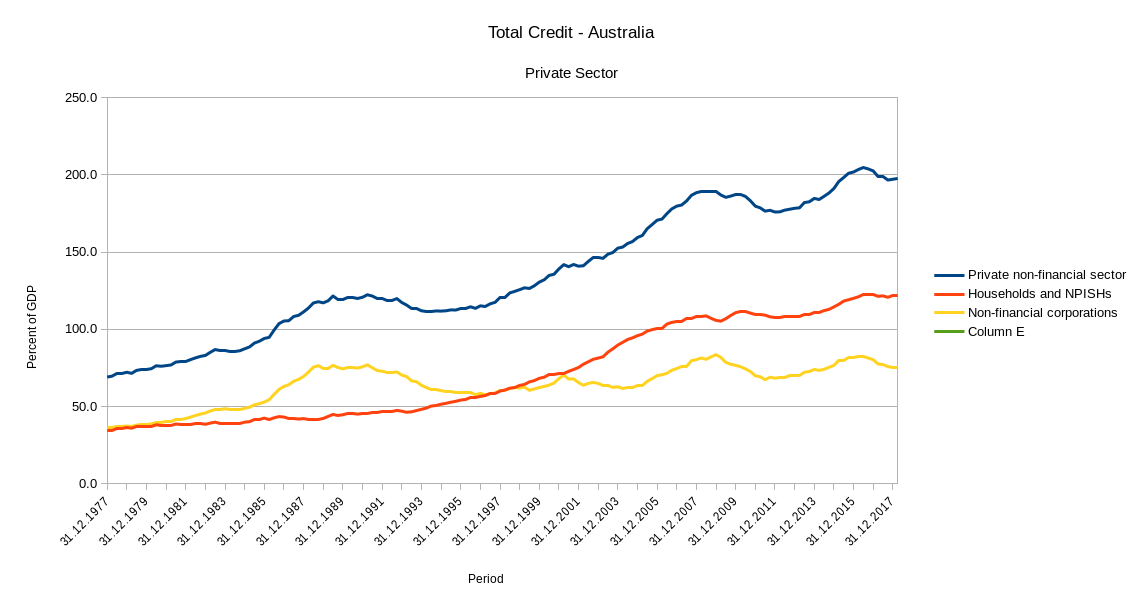Sunday, 21 October 2018 - 12:09pm
This week, I have been mostly reading:
- New Labour’s Irrational Adoration of Thatcher — Craig Murray:
When Michael Crick embarrassed Theresa May by quizzing her on her non-existent opposition to apartheid as she visited Mandela’s old cell, the response of New Labour was to defend May by claiming the Tories had opposed apartheid all along. Progress and Labour Friends of Israel rushed immediately to the defence of the person they truly adore, who sits higher still in their Pantheon than Tony Blair and Gordon Brown. They rushed to defend the memory of Margaret Thatcher.
- 'I leave the car at home': how free buses are revolutionising one French city — Kim Willsher in Dunkirk for the Guardian:
“Before, when they paid, it was a service and they were customers. They may have been only contributing 10% of the cost of running the service but they thought it was theirs. Now it’s a public service they look at it differently. They say ‘bonjour’ to the driver, they talk to each other. We are changing perceptions and transforming the city with more vivre ensemble. We are reinventing the public space. Before the bus was for those who had no choice: the young, the old, the poor who don’t have cars. Now it’s for everyone.”
- Battery drain — The Oatmeal:

Sunday, 14 October 2018 - 7:44pm
This week, I have been mostly reading:
- Perry Bible Fellowship — by Nicholas Gurewitch:
- There’s a psychological link between conspiracy theories and creationism — Stephan Lewandowsky in the Conversation:
The Fribourg researchers conducted three studies with more than 2,000 participants overall. Echoing previous studies, the findings showed that teleological thinking was associated with the rejection of evolution and the acceptance of its pseudo-scientific alternative, creationism. But the researchers also showed a strong association between creationism and conspiracism. People who believed in creationism also tended to believe in conspiracy theories, regardless of their religious or political beliefs. Conspiracism was also associated with teleological thinking. This confirms that seeking purpose in random events, such as the death of Princess Diana in a drink-driving accident, or natural phenomena such as rain clouds or the necks of giraffes, reflects a common underlying way of thinking.
- The economy of permanent war — Claire Connelly in Medium:
What the world thinks of as debt creation is actually the creation of credit for the financial sector. Dr Kadri says the west can make far more money from destruction than from trade. […] “You cannot expand the economy without war. War is, in fact, a necessity; it absorbs the surplus. By issuing bonds the state absorbs the excess surplus existent in the western hemisphere. That is the principal condition for global economic imbalance.” Issuing bonds has the effect of creating a military economy in a way that doesn’t interfere or compete with the private sector and acts as conveyer belt for its resources.
- Non Sequitur — by Wiley Miller:
Sunday, 7 October 2018 - 4:39pm
This week, I have been mostly reading:
- The Cruelty Is the Point — Adam Serwer at the Atlantic:
Trump’s only true skill is the con, his only fundamental belief is that the United States is the birthright of straight, white, Christian men, and his only real, authentic pleasure is in cruelty. It is that cruelty, and the delight it brings them, that binds his most ardent supporters to him, in shared scorn for those they hate and fear: immigrants, black voters, feminists, and treasonous white men who empathize with any of those who would steal their birthright. The president’s ability to execute that cruelty through word and deed makes them euphoric. It makes them feel good, it makes them feel proud, it makes them feel happy, it makes them feel united. And as long as he makes them feel that way, they will let him get away with anything, no matter what it costs them.
- Michael Lewis's new book 'The Fifth Risk' exposes the real decay under Trump — The Australian Financial Review publishes an excerpt:
Trump's first budget eliminated ARPA-E altogether. It also eliminated the spectacularly successful $70 billion loan program. It cut funding to the national labs in a way that implies the laying off of 6000 of their people. It eliminated all research on climate change. It halved the funding for work to secure the electrical grid from attack or natural disaster. "All the risks are science-based," said John MacWilliams when he saw the budget. "You can't gut the science. If you do, you are hurting the country. If you gut the core competency of the DOE, you gut the country." But you can. Indeed, if you are seeking to preserve a certain worldview, it actually helps to gut science. Trump's budget, like the social forces behind it, is powered by a perverse desire – to remain ignorant. Donald Trump didn't invent this desire. He was just its ultimate expression.
- Uri Avnery, the Israeli optimist who played chess with Yasser Arafat, has died – he was one of my few Middle East heroes — Robert Fisk at the Independent:
Uri Avnery suffered a massive heart attack at the weekend and died on Monday morning, but he was himself a Zionist, or at least a believer in a left-wing, courageous but humble “light among the nations” Israel; the kind many of us, in our heart of hearts, would like to believe in. He was the sort of Israeli that we bleeding heart liberals go and see when we arrive in Israel because they say what we want to hear.
- Last Survey — Bizarro by Dan Piraro:

No, really; everything's fine
Among the headlines in the AFR Real Estate section this morning:
- Brisbane buyers now look to sell at discount
- Mortgage payments to near 20-year high
- New home sales fall 27pc from peak
- 6700 projects across Australia blacklisted for loans
- Developers squeal over apartment price slump
So, soft landing?: "Allianz-owned PIMCO, like many analysts, expects a decline in overall housing prices of 10 per cent over the next couple of years and says the market slowdown engineered by macroprudential regulator APRA does not indicate a crash likely to threaten financial stability."
What's happened since the last time I looked at private sector debt to GDP ratios? Not much, but something:
If you zoom in on the post-GDP period (caution: non-zero y-axis origin ahead):
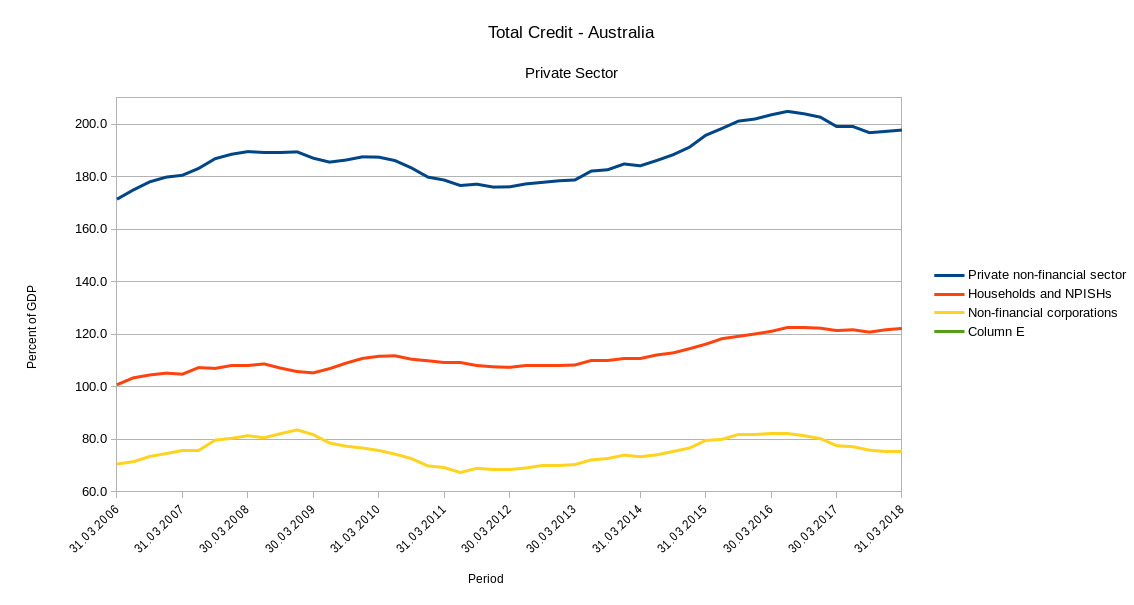
(Source: BIS total credit statistics)
Usual disclaimer: This is the rear mirror view. Only part of the picture, and systemic crises may be closer than they appear. The fall in the total since 2016 is entirely due to the corporate sector; the situation for households is no better than a couple of years ago. To get household debt down in the face of falling property values (which should never have been allowed - indeed encouraged - to get that high in the first place) somebody has to do some spending to both raise GDP and the income necessary for repayment of household debt. Corporations won't do it; they are delevering. Households can't do it; they have debt, not savings.
The government must step in to fill the spending gap by increasing benefits and decreasing taxes on households, and by employing (lots of) people. If they don't, the best outcome will be a continuation of the post-GFC new normal of stagnation and unnecessary hardship. As far as I can see, an Australian domestic mortgage-backed crash is no less likely in 2018/19 than in 2016, and the qualitative evidence (not least: sanguine predictions by very smart people with very vested interests, designed to quell restive animal spirits) points in the same direction.
Sunday, 16 September 2018 - 4:53pm
This week, I have been mostly reading comics:
- The ‘prosperity doctrine’ and neoliberal Jesusing, Scott Morrison-style — Van Badham in the Guardian:
He is a neoliberal and as treasurer he has governed neoliberally. Wage growth in Australia is stagnant, underemployment is rife. One of his earliest speeches was to condemn welfare recipients as the “taxed nots”, yet the policy he was most committed to pursue was the $65bn tax cuts for corporate Australia, including $17bn for the banks – the banks that are now recommended for criminal charges, from a banking royal commission Morrison described as a “populist whinge”. Who is such a person to lead this country? Well, if his own propaganda’s to be believed, a very holy man. Morrison spoke of his “personal faith in Jesus Christ” in his 2008 maiden speech, in which he also thanked pastors Brian Houston and Leigh Cameron of what has been described as a “money machine”, the Hillsong Church, for their “great assistance” to him. Citing Houston as “a mentor”, Morrison is a proud and public worshipper at the Horizon Church, which, like Hillsong, is Pentecostal, and similarly an “American-style mega-church ... where the gospel of prosperity is preached in an auditorium that can accommodate over 1,000 evangelicals” as described in a 2012 profile of Morrison in the Monthly.
- Voting Software — xkcd:
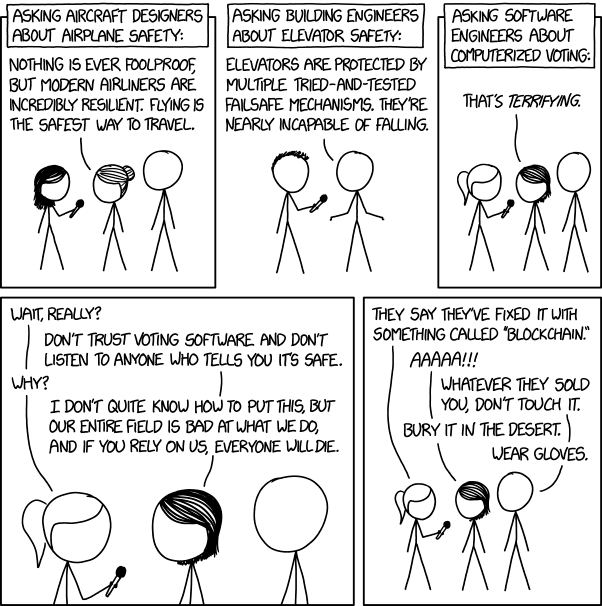
- The Non-University and the Manager — Binoy Kampmark at the Australian Independent Media Network:
The university manager is a born and dedicated philistine, and is one of the most important reasons why such institutions are not only failing students but failing staff. It is managers who, untutored but entirely self-interested, feather their nests while stomping on the innovative and shutting out the novel. The world of ideas is a world of offense, dangerous and to be avoided. […] The fundamental goal of management is not merely to control, monitor and mediate performance on the part of the neutered academic, an insistence that thought is obscene. (Thought, by its very act, cannot be managed). The academic must be restrained before the all-seeing-eyes of the brand label police and authoritarians.
- Seder — Saturday Morning Breakfast Cereal by Zach Weinersmith:
.png)
- Life after death — Frances Coppola:
Having seen my father die, I am more convinced than ever that we have only one life. Our job is to live it to the best, using our talents and abilities to the full, overcoming the constraints of our circumstances and our disabilities to the extent that we can. And because we are social creatures, living life to the full means helping others to make the best of their lives, too. Being truly human means giving the best that we have to offer without restraint, without counting the cost, and without any expectation of reward. Selfishness, that hoards what we do not need while those in need suffer, is inhuman. Those who deliberately seek to deprive others of the opportunity to make the best of their abilities and overcome their circumstances are evil beyond belief. Depriving another person of any hope of a better life is the most terrible thing you can do to them. When hope is gone, life is not worth living - and there is no other life that we know about. Ending someone's hope is tantamount to murder.
- The Cat Got Into Our Stash — Phil Are Go!:

- “Hothouse Earth” Co-Author: The Problem Is Neoliberal Economics — Kate Aronoff at the Intercept:
Coverage of the paper tended to focus on one of its more alarming claims, albeit one that isn’t new to climate researchers: that a series of interlocking dynamics on Earth — from melting sea ice to deforestation — can feed upon one another to accelerate warming and climate impacts once we pass a certain threshold of warming, even after humans have stopped pouring greenhouse gases into the atmosphere. The best chance we have for staying below that catastrophic threshold is to cap warming at around 2 degrees Celsius, the target enshrined in the Paris Agreement. That’s all correct and plenty daunting. Yet embedded within the paper is a finding that’s just as stunning: that none of this is inevitable, and one of the main barriers between us and a stable planet — one that isn’t actively hostile to human civilization over the long term — is our economic system. Asked what could be done to prevent a hothouse earth scenario, co-author Will Steffen told The Intercept that the “obvious thing we have to do is to get greenhouse gas emissions down as fast as we can. That means that has to be the primary target of policy and economics. You have got to get away from the so-called neoliberal economics.” Instead, he suggests something “more like wartime footing” to roll out renewable energy and dramatically reimagine sectors like transportation and agriculture “at very fast rates.”
- An anonymous Op-Ed from the World War II French Resistance — Tom the Dancing Bug by Ruben Bolling:

Sunday, 26 August 2018 - 4:35pm
This week, I have been mostly reading:
- Hundreds of Researchers From Harvard, Yale and Stanford Were Published in Fake Academic Journals — Daniel Oberhaus for Motherboard:
In the so-called “post-truth era,” science seems like one of the last bastions of objective knowledge, but what if science itself were to succumb to fake news? Over the past year, German journalist Svea Eckert and a small team of journalists went undercover to investigate a massive underground network of fake science journals and conferences. In the course of the investigation, which was chronicled in the documentary “Inside the Fake Science Factory,” the team analyzed over 175,000 articles published in predatory journals and found hundreds of papers from academics at leading institutions, as well as substantial amounts of research pushed by pharmaceutical corporations, tobacco companies, and others. Last year, one fake science institution run by a Turkish family was estimated to have earned over $4 million in revenue through conferences and journals.
- The biggest policy mistake of the last decade — Ryan Cooper in the Week:
After the 2008 financial crisis, old-fashioned Keynesians offered a simple fix: Stimulate the economy. With idle capacity and unemployed workers, nations could restore economic production at essentially zero real cost. It helped the U.S. in the Great Depression and it could help the U.S. in the Great Recession too. But during and immediately after the crisis, neoliberal and conservative forces attacked the Keynesian school of thought from multiple directions. Stimulus couldn't work because of some weird debt trigger condition, or because it would cause hyperinflation, or because unemployment was "structural," or because of a "skills gap," or because of adverse demographic trends. Well going on 10 years later, the evidence is in: The anti-Keynesian forces have been proved conclusively mistaken on every single argument. Their refusal to pick up what amounted to a multiple-trillion-dollar bill sitting on the sidewalk is the greatest mistake of economic policy analysis since 1929 at least.
- We’re in a new age of obesity. How did it happen? You’d be surprised — George Monbiot in the Guardian:
As Jacques Peretti argued in his film The Men Who Made Us Fat, food companies have invested heavily in designing products that use sugar to bypass our natural appetite control mechanisms, and in packaging and promoting these products to break down what remains of our defences, including through the use of subliminal scents. They employ an army of food scientists and psychologists to trick us into eating more than we need, while their advertisers use the latest findings in neuroscience to overcome our resistance. They hire biddable scientists and thinktanks to confuse us about the causes of obesity. Above all, just as the tobacco companies did with smoking, they promote the idea that weight is a question of “personal responsibility”. After spending billions on overriding our willpower, they blame us for failing to exercise it.
- Omarosa’s New Book — Ted Rall:

- Miscalculating Medicare-for-all — J.D. Alt at New Economic Perspectives:
We habitually imagine these treasury operations to be “borrowing”—and even tally them up as something we call the “national debt.” But modern analysis and explanation shows that in a sovereign money system the definition of “borrowing” does not apply to treasury operations; the securities created by the operations, themselves, are “money” issued—as needed—by the federal government. Thus, the U.S. government can (and does) pay for anything that Congress deems necessary or desirable—so long as it’s for sale in U.S. dollars—without collecting tax-dollars. Regarding Medicare-for-all, then, the initial pertinent question is NOT whether we can raise enough taxes to cover $3.3 trillion in new expenditures (that question is not pertinent at all!)—the question is whether the medical services to be purchased are actually available in America. Do we have the doctors and nurses, the hospitals and clinics, necessary to provide the care and procedures? If so, and if Congress decides it is in the interest of the American people to have access to that care, the U.S. treasury can, through its securities operations in coordination with the Federal Reserve, create the “health-dollars” necessary to pay the bill.
- Trump Officials Were Warned That Family Separations Would Traumatize Children — Ryan Devereaux at the Intercept:
The government’s program of forcibly removing thousands of children from their parents, including toddlers and babies, was the result of conscious decisions made by specific Trump administration officials. Tuesday’s hearing added new data points to that story, with a career civil servant testifying that his office, tasked with providing care for minors in the immigration system, raised concerns with administration officials in the year leading up to “zero tolerance” becoming an official policy, warning that the separation of children from their parents would put the children at risk of serious psychological harm and that the system was not built to handle such an initiative. Additionally, officials testified that there was little warning within their respective agencies that “zero tolerance” was actually being implemented until it was imminent, or already happening.
Sunday, 12 August 2018 - 3:51pm
This week, I have been mostly reading:
- Ecuador Will Imminently Withdraw Asylum for Julian Assange and Hand Him Over to the U.K. What Comes Next? — Glenn Greenwald at the Intercept:
Assange, his lawyers and his supporters always said that he would immediately board a plane to Stockholm if he were guaranteed that doing so would not be used to extradite him to the U.S., and for years offered to be questioned by Swedish investigators inside the embassy in London, something Swedish prosecutors only did years later. Citing those facts, a United Nations panel ruled in 2016 that the actions of the U.K. government constituted “arbitrary detention” and a violation of Assange’s fundamental human rights. But if, as seems quite likely, the Trump administration finally announces that it intends to prosecute Assange for publishing classified U.S. government documents, we will be faced with the bizarre spectacle of U.S. journalists — who have spent the last two years melodramatically expressing grave concern over press freedom due to insulting tweets from Trump about Wolf Blitzer and Chuck Todd, or his mean treatment of Jim Acosta — possibly cheering for a precedent that would be the gravest press freedom threat in decades.
- I traced missile casings in Syria back to their original sellers, so it’s time for the west to reveal who they sell arms to — Robert Fisk in the Independent:
Readers, a small detective story. Note down this number: MFG BGM-71E-1B. And this number: STOCK NO 1410-01-300-0254. And this code: DAA A01 C-0292. I found all these numerals printed on the side of a spent missile casing lying in the basement of a bombed-out Islamist base in eastern Aleppo last year. At the top were the words “Hughes Aircraft Co”, founded in California back in the 1930s by the infamous Howard Hughes and sold in 1997 to Raytheon, the massive US defence contractor whose profits last year came to $23.35bn (£18bn). Shareholders include the Bank of America and Deutsche Bank. Raytheon’s Middle East offices can be found in Saudi Arabia, the United Arab Emirates, Israel, Egypt, Turkey and Kuwait. There were dozens of other used-up identical missile casings in the same underground room in the ruins of eastern Aleppo, with sequential codings; in other words, these anti-armour missiles – known in the trade as Tows, “Tube-launched, optically tracked and wire-guided missiles” – were not individual items smuggled into Syria through the old and much reported CIA smugglers’ trail from Libya. These were shipments, whole batches of weapons that left their point of origin on military aircraft pallets.
- Behind Greece’s Deadly Fires — Yanis Varoufakis for Project Syndicate:
Over the course of a decade, we have lost many more people to the tragedy caused by the EU establishment than to any flood or forest fire. More than 20,000 people have committed suicide since 2011, while one in ten working-age Greeks have emigrated because of the economic depression the EU has imposed on Greece. I expect crocodile tears to be shed in Brussels over our fire victims, and similarly hypocritical posturing by the Greek government. But I do not expect any reversal of the organized misanthropy afflicting Greece just because nearly 100 died in a single day. Unless and until progressives across Europe get organized, accept local responsibility, and band together to apply pressure at the EU level, nothing will change, except a further strengthening of proudly misanthropic political forces like Greece’s Golden Dawn, Italy’s Lega, Germany’s Christian Social Union and Alternative für Deutschland, Sebastian Kurz’s Austrian government, and the Polish-Hungarian illiberal nexus. In this context, Greece’s forest fires are a tragic reminder of our collective responsibility as Europeans.
Sunday, 29 July 2018 - 5:38pm
This weekend, I have (hopefully) hit the nadir of a chest infection, and haven't been able to think about anything but coughing. It's all up from here:
- #1410; In which a Missile is Medicine — Wondermark by David Malki !:

- Why bad technology dominates our lives, according to Don Norman — by, unsurprisingly, Don Norman in Fast Company:
We need to switch from a technology-centric view of the world to a people-centric one. We should start with people’s abilities and create technology that enhances people’s capabilities: Why are we doing it backwards? We have turned the positive trait of curiosity into two negative ones. One is that of distraction, leading to accidents; the other is that of following the trails on enticement leading to addiction. We have our priorities completely wrong.
- College Level Mathematics — Saturday Morning Breakfast Cereal by Zach Weinersmith:
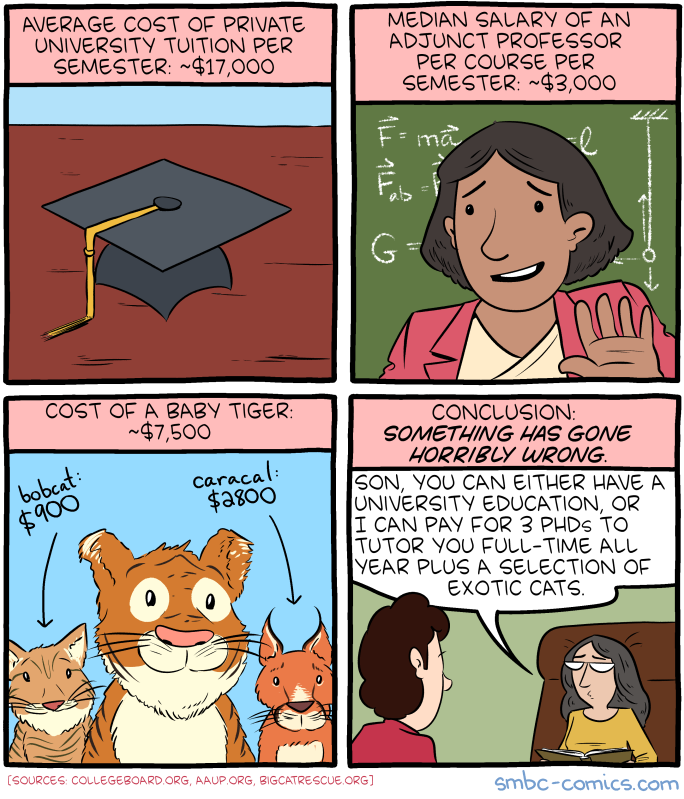
- Software Development — xkcd:
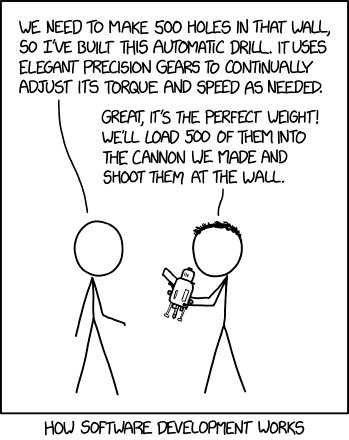
Sunday, 8 July 2018 - 5:52pm
Lately, I have been mostly reading:
- Here's what I saw at the border — Elizabeth Warren, Daily Kos:
An ICE official brought in a group of nine detained mothers who had volunteered to speak to us. I don't believe that ICE cherry-picked these women for the meeting, because everything they told me was horrifying. Each mother told us her own story about crossing the border, being taken to a processing center, and the point that they were separated from their child or children. In every case, the government had lied to them about where their children were being taken. In every case, save one, no mother had spoken to her child in the days since the separation. And in every case, no mother knew where her child was.
- Army of Altruists: On the alienated right to do good — An essay by David Graeber from 2007:
Imagine, for a moment, that the United States as it exists today were the creation of some ingenious social engineer. What assumptions about human nature could we say this engineer must have been working with? Certainly nothing like rational choice theory. For clearly our social engineer understands that the only way to convince human beings to enter into the world of work and the marketplace (that is: of mind-numbing labor and cut-throat competition) is to dangle the prospect of thereby being able to lavish money on one’s children, buy drinks for one’s friends, and, if one hits the jackpot, to be able to spend the rest of one’s life endowing museums and providing AIDS medications to impoverished countries in Africa. Where our theorists are constantly trying to strip away the veil of appearances and show how all such apparently selfless gesture really mask some kind of self-interested strategy, in reality, American society is better conceived as a battle over access to the right to behave altruistically. Selflessness – or at least, the right to engage in high-minded activity – is not the strategy. It is the prize.
- Is Michael Cohen ready for the John Dean role: A hero who saves America from Donald Trump? — Heather Digby Parton in Salon panders to my worst scandalphilic tendencies:
In the interview, Stephanopoulos asked Cohen whether he could say that Trump told him to pay off Stormy Daniels and whether Trump knew about the Trump Tower meeting with the Russians in June 2016. Cohen said he could not answer on the advice of his attorney, which certainly implies that the answer to both questions is yes. Of course, Trump would know the answer was yes. If the president is inclined to issue a pardon, Cohen is saying he'd better do it soon. But keep in mind that this is TrumpWorld we're talking about, and among those people, you really don't exist unless you're on TV. All this may have more to do with Michael Cohen trying to figure out how he can parlay this situation into a new career in media once this mess is over. There's only one clear way for him to do that: Take the John Dean route and become the man who saved America from Donald Trump. Dean lost his law license and did four months in jail, but he is now considered a hero and a national icon. It's not a bad model.
- The fallacy of obviousness — Teppo Felin in Aeon:
In fact, the current focus on human blindness and bias – across psychology, economics and the cognitive sciences – has contributed to the present orthodoxy that sees computers and AI as superior to human judgment. As Kahneman argued in a presentation last year: ‘It’s very difficult to imagine that with sufficient data there will remain things that only humans can do.’ He even offered a prescription that we ‘should replace humans by algorithms whenever possible’. Because humans are blind and biased, and can’t separate the noise from the signal, human decision-making should increasingly be left to computers and decision algorithms. This ethos has helped to fuel great excitement about AI and its attendant tools such as neural networks or deep learning. Proponents even claim that big data and associated computational methods will change the nature of science. For example, in 2008 Chris Anderson, then editor of Wired, boldly proclaimed ‘the end of theory’, as the ‘data deluge makes the scientific method obsolete’. Naturally, what we assume about human nature will determine the type of science we do, as well as shaping the types of questions we ask of it.
- Employer groups in Australia lied about the impacts of penalty rate cuts — Bill Mitchell:
Given we received the latest employment by industry data in the last fortnight, we can undertake some detailed analysis to see whether there is any evidence to support the employers’ claims that the cuts would benefit jobs and hours of work in the impacted sectors (Retail Trade and Accommodation and Food Services). You will not be surprised to read that the opposite seems to be the case, although the generally poor results for the industries that are sensitive to the penalty rate cuts cannot be attributed directly to those cuts. But the evidence is very strong – the cuts to penalty rates have hurt low paid workers and driven then towards or over the poverty line with no positive effects being evident in terms of employment or working hour gains.
Sunday, 17 June 2018 - 6:34pm
This erm… month, I have been mostly reading:
- Centrelink duty of care has failed, regardless of Information Commissioner ruling — Peter Tonoli at Electronic Frontiers Australia. Oh, my! Stay classy, Centrelink:
Privacy rights groups Digital Rights Watch, the Australian Privacy Foundation and Electronic Frontiers Australia have slammed a statement by the Office of the Information Commissioner and the Privacy Commissioner that their investigation found no wrongdoing in the release of personal information by a government department. In February 2017, writer Andie Fox wrote an article that was critical of Centrelink’s controversial debt recovery program. In response, the office of the former Human Services Minister Alan Tudge released Ms Fox’s personal details (including details of Fox’s relationship and her tax and claims history) to another journalist, who subsequently published an article countering Fox’s claims.
- People Can't Pay Rent, Debt Is Insane, and the Economy Is Somehow 'Great' — Matt Taylor at VICE:
Unemployment, as President Trump took care to remind us with another unhinged and hyperbolic tweet this week, is at an almost 50-year low. After a spectacular 2017 and iffy early stretch this year, the stock market is once again trading high. Banks just enjoyed their most profitable quarter ever, encouraging the chair of the Federal Reserve—Wall Street vet and Trump pick Jerome Powell—to declare the economy in "great shape" Wednesday, and even raise interest rates on the debt owed by millions of Americans. On the surface, things look good, right? Maybe that's why a new report from the Low Income Housing Coalition, a liberal advocacy group working in partnership with Senator Bernie Sanders, landed with such a resounding thud Wednesday. The chief takeaway wasn't even the most breathtaking, even if it still felt like a gut punch: There is not a single county in America where someone earning minimum wage can afford to rent a two-bedroom apartment while working a normal 40-hour week. More shocking: You would have to work 122 hours a week for all 52 weeks of the year to afford rent on a two-bedroom at the national average rate on the federal minimum wage of $7.25. You don't need to be a democratic socialist firebrand or an advocate for the poor or even a policy wonk to see that something is deeply, deeply out of whack here.
- Recycling crisis exposes the market’s failure — James Supple in Solidarity Online:
Previously, collection companies could make money by selling recyclable waste to Chinese companies. Now that they have stopped buying it, the price waste companies can get from selling the materials has plummeted. So companies are asking for higher fees to collect recycling from local councils—with no guarantee the waste will actually be recycled.
- Cave Art — Bizarro! by Dan Piraro:




